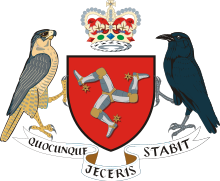Legislative Council (Isle of Man)
The Legislative Council ( German : Legislative Council , manx : Yn Choonceil Slattyssagh ) of the Isle of Man is the upper house of the island parliament, the Tynwald . The House of Commons is the House of Keys .
The council consists of eleven members, eight indirectly elected and three ex officio, who are called Members of the Legislative Council (MLC). The House of Keys elects MLCs, who must be at least twenty-one years old and have been on the island for three years, for a five-year term. Four members are elected at once, so that the council is successively renewed.
The lieutenant governor was previously chairman of the Legislative Council and Tynwald Court, a joint session of the two chambers. Nowadays, however, the President of Tynwald , who is elected by the entire Tynwald for five years, is also ex officio chairman of the Legislative Council. He chairs both the Council and Tynwald Court, except once a year on Tynwald Day , which is still chaired by the Lieutenant Governor. In addition, the Bishop of the Diocese of Sodor and Man of the Church of England and the Attorney General appointed by the British monarch have seats on the council. The president only has one vote that decides a stalemate, the bishop can vote like all other members, the attorney general not at all.
The original task of the Legislative Council was to advise the Vice-Governor and thus of an executive nature. It consisted entirely of appointed members and was composed as follows:
- Lieutenant Governor of the Isle of Man
- First Deemster
- Second Deemster
- Clerk of the Rolls
- Attorney General of the Isle of Man
- Settlement receiver (Receiver General)
- Lord Bishop of Sodor and Man
- Archdeacon of Sodor and Man
- Vicar General
The first seven were appointed by the crown, the last two by the bishop. In a gradual reform process, the number of judicial and clerical members was reduced and their seats were filled by indirectly elected members. The House of Keys soon removed the archdeacon, vicar general, and the bill-taker. Subsequently, the lieutenant governor was removed from the adjudicatory bank and the position of trustee of the roles was taken ex officio by the First Deemster . In 1965 the Second Deemster was removed from the center of the Council, the First Deemster in 1975 and finally the Lieutenant Governor himself in 1980. Today only the President, the Bishop and the Attorney General are ex officio members.
The Council does not usually put legislation in motion (until 2016 the last law that originated in the Council was from 1986). Instead, it reviews the laws the House of Keys makes. The Council has little influence within the Tynwald as an organ elected by the Keys.

